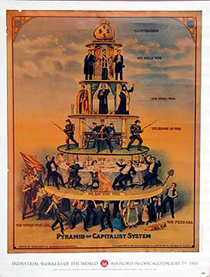Election Officials in Denver Held to Accountability for Poor Operations
Denver Post: City elections chief quits
The resignation of John Gaydeski, 59, follows that of Wayne Vaden, the city clerk and recorder, who was appointed to the Election Commission by Mayor John Hickenlooper.
Both men have apologized for Denver's problem-plagued election last month, which the nonpartisan organization Electionline.org called one of the country's most flawed votes.
Denver voters stood in line for up to three hours because of problems with the computer software used to check in voters. Officials estimate about 20,000 people didn't vote because of the issues.
"I certainly assume full responsibility for any contributions I may have made to those problems," Gaydeski wrote in his resignation letter.
Also last month, the commission's technology director, Anthony Rainey - one of two computer experts at the Election Commission - was put on administrative leave. .....more
If it can happen in Denver, why isn't it happening elsewhere, ESPECIALLY Florida? In Jacksonville for instance, the supervisor of elections--Jerry Holland offered dubious excuses for another poor performance:
Duval County's supervisor of elections spent election night explaining why results were trickling out at a snail's pace and battling the technical difficulties causing those delays. ...Unfortunately the local newspaper there -- The Florida Times Union -- is a perfect example of a knee-jerk neo-con organization employing reporters purely as stenographers. No real journalists, especially the investigative type, need apply.
And at the end of election night, Jerry Holland was handed a letter of resignation from his director of communications, a woman he hired when he was City Council president and brought with him to the elections office.
Cindy Warner said she was frustrated about not being able to communicate directly with and answer directly to her boss.
"That was one of the conditions in my taking the job, a deal-breaker I guess you'd call it," Warner said. "That changed after the [last] primary election, and as far as I'm concerned, your word is your word."
It was about 9:20 p.m. before results showed up on the Duval County elections Web site, with only 18 percent of precincts completed.
Holland blamed much of the problem on two weeks of early voting at 15 sites, which dramatically multiplies the number of computer memory cards that have to be uploaded.
Each site had several machines, and two types of machines - touch screens and optical readers for paper ballots, with separate memory cards. The result, he said, is that he ended up with more than 1,000 memory cards as a result of early and absentee voting. That's in addition to the 570 cards - two each (from touch and optical machines) for all 285 precincts.
"Early voting can significantly slow posting the results, but it's a trade-off that's well worth it - because you increase accessibility to the voter, and that's key," he said.
The process was slowed by about another half hour, he said, because of problems with an Internet server used by hundreds of elections offices in the Southeast. The server translates the results into colorful graphics and color-coded maps.
Holland has asked the company, SOE Software, to do an analysis and expects results by early next week. He said tests of the system during past weeks worked well.
"They told us it was nothing on our end, that there was nothing we were doing wrong," he said.
He also said he is asking the company to install an improved, fiber-optic line to the elections center.
Holland said about 10:30 p.m. he instructed his technical staff to convert to a simpler print-like display without graphics to speed up posting the results.
About 96 percent of precincts were reported by 11:20 p.m. and election results were complete about 2 a.m., he said.
Holland denied that a staff shake-up in his office after the September primary election had any effect on the slow reporting of results. Having a larger information technology staff would also make no difference in the speed of reporting results, he said.
Holland said he understands that in a digital age, people expect instant results.
"What they forget is that we're greatly enhancing accessibility to the voting process," he said. "But it's a fast-food society and we want everything now. I think the public has to learn the cost of more accessibility may be slightly slower results."
He said he also thinks people not only want the results instantly, but the outcome instantly as well.
"They forget," he said, "that if it's a very close election we may not have results for days."
Even the DOJ appointed an Assistant US Attorney to act as a special Election Officer to monitor election complaints in Florida.
And lordy knows they needed it in Congressional District 13 of the outgoing Katherine 'let them eat cake while I steal the 2000 election from Al Gore' Harris where 18,000 votes (apparently all or most for democrats) disappeared into nothingness and with no paper trails... C'est La Vie, suckers! ElectionOnline.org understates it this way:
"A Congressional race in Florida's Sarasota County was plagued with high numbers of under votes, about 14 percent of all ballots cast recording no preference in a hotly contested race to replace Rep. Katherine Harris in the state's 13th District."Also from their Election Reform Briefing 15: The 2006 Election --
The 2006 Election, the 15th in a series of policy briefings by electionline.org, found widespread reports of voting system troubles, sporadic incidents of voter intimidation and/or poll worker confusion over voter identification requirements and some breakdowns at polling places because of newly-mandated voter registration systems.Full Denver Post story here. More about the problems in the 13th District here and here.
Voting Fraud Electronic Voting E-Voting Elections 2006 Election Problems Voting Problems News Scandals PoliticsCommentary Republicans Democrats Katherine Harris Florida Elections Stolen Elections Stolen Votes Denver Elections Denver Election Problems Denver Post journalists reporters Jacksonville Florida Times Union Electionline.org







0 Comments:
Post a Comment
<< Home